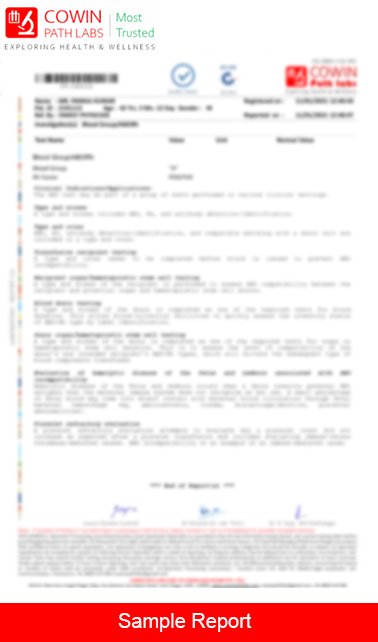Home Special Offers Test Details
- Patient/Guest
- Phlebotomist
- Updates
| CPK-MB |
|---|
|
Diagnosing and monitoring myopathies or other trauma, toxin, or drug-induced muscle injury |
||
| Synonym | CK-MB | |
| Test Code | ||
| Test Type | Biochemistry | |
| Pre-Test Condition | Nothing Special | |
| Report Availability | Daily | |
| # Test(s) | 1 | |
| Test details | Sample Report |
|---|---|
| CPK-MB |

|
| Synonym | CK-MB | ||
| Test Code | |||
| Test Category | Biochemistry | ||
| Pre-Test Condition | Nothing Special | ||
| Medical History | Share if any | ||
| Report Availability | Daily | ||
| Specimen/Sample | Blood | ||
| Stability @21-26 deg. C | 6 Hrs | ||
| Stability @ 2-8 deg. C | NA | ||
| Stability @ Frozen | NA | ||
| # Test(s) | 1 | ||
| Processing Method | NADPH | ||
|
USEFUL FOR Diagnosing and monitoring myopathies or other trauma, toxin, or drug-induced muscle injury CLINICAL INFORMATION Creatine kinase (CK) is an enzyme that catalyzes the reversible phosphorylation of creatine (Cr) by adenosine triphosphate (ATP). Physiologically, when muscle contracts, ATP is converted to adenosine diphosphate (ADP), and CK catalyzes the rephosphorylation of ADP to ATP using creatine phosphate as the phosphorylation reservoir. The CK enzyme is a dimer composed of subunits derived from either muscle (M) or brain (B). Three isoenzymes have been identified: striated muscle (MM), heart tissue (MB), and brain (BB). Normal serum CK is predominantly the CK-MM isoenzyme. CK activity is greatest in striated muscle (MM isoenzyme ), heart tissue (MB isoenzyme ), and brain (BB isoenzyme ). Serum CK concentrations are reflective of muscle mass causing males to have higher concentrations than females. CK may be measured to evaluate myopathy and to monitor patients with rhabdomyolysis for acute kidney injury. REFERENCE VALUES Males < or =3 months: not established >3 months: 39-308 U/L Females < or =3 months: not established >3 months: 26-192 U/L Reference values have not been established for patients that are less than 3 months of age. Note: Strenuous exercise or intramuscular injections may cause transient elevation of creatine kinase (CK). INTERPRETATION Serum creatine kinase (CK) activity may increase in patients with acute cerebrovascular disease or neurosurgical intervention and with cerebral ischemia as well as in nearly all patients when injury, inflammation, or necrosis of skeletal or heart muscle occurs, including: -All types of muscular dystrophy particularly in progressive muscular dystrophy (particularly Duchenne sex-linked muscular dystrophy). -Viral myositis, polymyositis, and similar muscle diseases -Malignant hyperthermia, an inherited life-threatening condition characterized by high fever and brought on by administration of inhalation anesthesia -Muscle trauma, which causes CK elevations within 12 hours of onset, peaking within 1 to 3 days, and declining 3 to 5 days after cessation of muscle injury ---Serum CK activities exceeding 200 times the upper reference limit may be found in acute rhabdomyolysis, putting the patient at great risk for developing acute renal failure. -When given at pharmacologic doses, some drugs including statins, fibrates, antiretrovirals, and angiotensin II receptor antagonists -Endocrine myopathy, for which hpothyroidism is a common cause, about 60% of hypothyroid subjects show an average elevation of CK activity 5-fold greater than the upper reference limit -Normal childbirth causes a 6-fold elevation in maternal serum For detection of myocardial infarction, changes in serum CK and its heart tissue (MB) isoenzyme have been largely replaced by the more cardiac-specific nonenzymatic markers, cardiac troponin I or T. CAUTIONS Exercise, muscle trauma (contact sports, traffic accidents, intramuscular injections, surgery, convulsions, wasp or bee stings, and burns), and drugs such as cholesterol-lowering statins can damage muscle and increase serum creatine kinase (CK) concentrations. CK concentrations have been found to be relatively higher in black race populations. CLINICAL REFERENCE 1. Tietz Clinical Guide to Laboratory Tests. Fourth edition. Edited by Wu AHB. St. Louis, Saunders Elsevier, 2006;306-307 2. Huerta-Alardin AL, Varon J, Marik PE: Bench-to-bedside review: Rhabdomyolysis -- an overview for clinicians. Crit Care 2005 Apr;9(2):158-169 3. Morandi L, Angelini C, Prelle A, et al: High plasma creatine kinase: review of the literature and proposal for a diagnostic algorithm. Neurol Sci 2006 Nov:27(5):303-311 |
